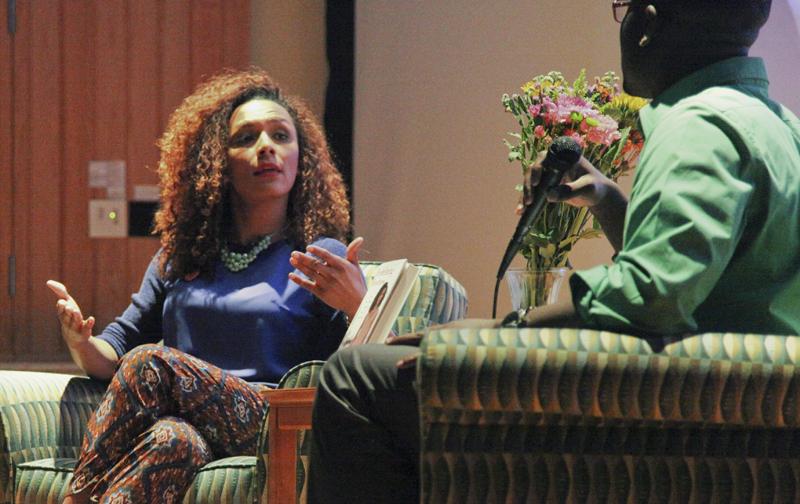Mock Headlines Queerfest Programming
American trans* rights activist, author and former staff editor of People magazine’s website visited Oberlin on Tuesday as a part of her “Redefining Realness” book tour. During her talk, Mock discussed her experience as a trans woman of color and a best-selling author.
April 25, 2014
Despite many successes across the board, such as bringing world-famous trans* advocate Janet Mock to speak on Tuesday, Queerfest organizers are concerned that this year’s events will go under-attended.
This year marks the first that students do not need to attend a Queerfest event in order to obtain a ticket to Drag Ball, which punctuates the weeklong series of workshops celebrating LGBTQ identities.
“I sincerely hope that people attend Queerfest events regardless of the voucher situation, as it is vital that our community educate itself about queer and trans* issues,” said College sophomore Kaïa Austin in an email to the Review.
“I hope that Drag Ball will continue to be an affirming and validating space for people with non-normative gender identities, and would like to see Oberlin as a whole become more affirming.”
College senior Ale Requena Ruiz is not so optimistic, and instead believes that this change undermines the educational purpose of Queerfest events.
“I hope that people who go [to Queerfest events] just to get a voucher do actually end up learning things from these events,” Ruiz said. “Yesterday I was at the Feve, for example, and someone was like ‘Yeah, you don’t even have to go to a Queerfest event in order to get a voucher to go to Drag Ball, so you should definitely go to Drag Ball,’ and it’s like, well, you’re kind of missing the point.”
Drag Ball, a perennially popular Queerfest event, is what many students consider to be Queerfest’s main attraction. Described as an opportunity to “playfully resist gender norms” and speak to “the legacy of activism at Oberlin” by the College’s website, this year’s Drag Ball will boast an astrological theme, and is set to feature Milk Queen from Season six of RuPaul’s Drag Race, Princess Nokia (also known as Wavy Spice), La’Fem Ladosha and Macy Rodman, the currently-reigning Mrs. Williamsburg.
Another highly-anticipated event was a talk by author and trans* advocate Janet Mock, who visited campus last Tuesday to discuss her road to womanhood and self-acceptance. “I’ve read so many amazing things about Janet Mock on the internet, and I think she’s incredible. … I’m really excited to be here,” said College junior Una Creedon-Carey.
Mock, the author of the book Redefining Realness: My Path to Womanhood, Identity, Love & So Much More, is a trans woman and vocal advocate for trans* rights. Since she publicly came out as a trans woman in 2011, Mock has worked to build awareness around issues trans* people face and encouraging trans women to live visibly. The talk was sponsored by Third World Co-op and ABUSUA as part of the “My Name is My Own” lecture- ship series.
Mock spoke to a packed Nancy Schrom Dye Lecture Hall about a variety of topics, including her childhood in Hawaii, her thoughts on the concept of “passing” and her involvement in the #GirlsLikeUs movement. Throughout the talk, she emphasized her role as a trans woman of color and how those identities intersect.
Mock closed her visit with a reading about Beyoncé from her book.
“[Beyoncé] was the mold for me. She made me love being brown, she made me love my adaptable curly hair, she made me love that my thighs touched,” read Mock.
“Transnational And Immigrant Queer Narratives at Oberlin” is also a part of the Immigration Action NOW! series and Asian Pacific American Heritage Month. Event planner and College junior Joelle Lingat said that she feels this event reflects the intersection of many different identities.
“If we look critically at what the definitions of ‘immigrant’ and ‘trans- national’ and ‘queer’ are, the primary commonality is the liminal experience,” Lingat said in an email to the Review.
“It means not being quite one identity and not being quite the other. These words are defined by the very fluidity of their definitions. These identities occupy a gray space that when in intersection with one another, create multi-dimensional layers to a person’s life. Not one person who is “immigrant” or “queer” or even “immigrant” and “queer” and “transnational” has the same wants and needs and dreams, regardless if they have similar narratives. These words give us community but also have the danger of boxing us in, inflicting further violence upon us and each other,” said Lingat.
In addition to hosting an array of speakers, other events such as Queer Crafting and Colors of Rhythm ap- proach the topic through a variety of different mediums. Colors of Rhythm, now in its 18th year, is an event that highlights dance forms outside the mainstream campus culture.
The second annual Queer Merengue Madness is another dance-based event in the series. Acting as a fundraiser for Oberlin High School’s Gay Straight Alliance, Queer Merengue Madness hopes to create a safe space and strengthen the ties between the city and College’s LGBTQ communities.
Other speakers involved in Queerfest included a panel on black masculinity and Rhacel Parreñas, a sociologist studying women’s labor and migration. A panel held Thursday night explored the intersection of immigrant, transnational and queer identities.
“There are queer people with immigrant and transnational experiences on campus and that isn’t really a voice … or voices or experiences or narratives, that get heard a lot on campus because the focus is so much on … white U.S. queer experiences a lot of times when talking about queerness and not ac- knowledging that people come from di- verse backgrounds that influence how they relate to queerness,” said College senior panelist Requena Ruiz.
























